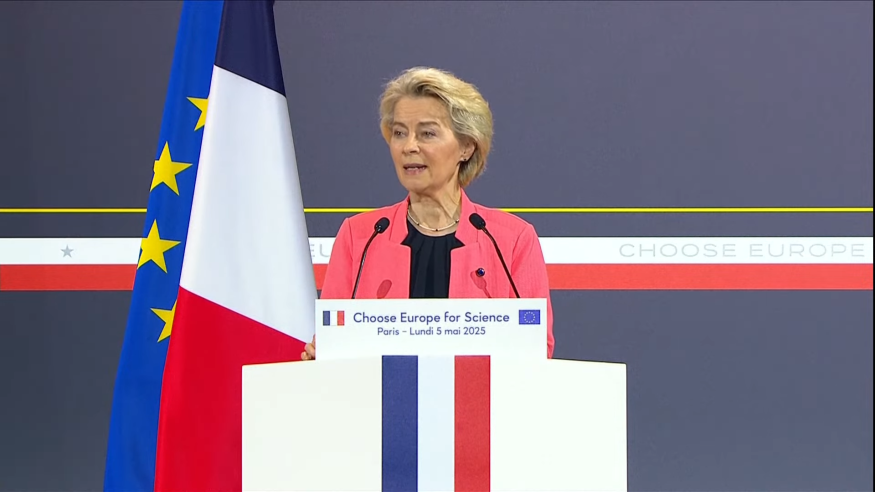
With funding for US scientists dwindling as a result of President Donald Trump's orders, European Commission President Ursula von der Leyen delivered a passionate appeal to the global scientific community, inviting researchers—particularly from the United States—to 'Choose Europe' as their base for scientific discovery, innovation, and collaboration.
A Call to Keep Science Open, Free, and Universal
In her keynote address at the 'Choose Europe for Science' event, von der Leyen underscored the deep connection between Europe's heritage of scientific excellence and its future potential.
Citing the inspiring story of Marie Skłodowska-Curie, she illustrated Europe's long-standing commitment to academic freedom, diversity, and open inquiry.
'Science has no passport, no gender, no ethnicity or political party,' she said, emphasising that these universal values are central to Europe's identity.
Von der Leyen warned against the growing global trend of questioning the value of fundamental and open research, calling it a 'gigantic miscalculation.'
She reinforced the EU's belief that science is the key to tackling global challenges—from health to climate change—and reaffirmed the bloc's unwavering support for freedom of scientific research.
Introducing the 'Choose Europe' Plan
Von der Leyen's speech focused on unveiling the European Commission's new 'Choose Europe' initiative—an ambitious, multi-pronged strategy for attracting and retaining top global talent in research and development.
The initiative focuses on three pillars:
- Protecting Scientific Freedom: The EU will introduce a new European Research Area Act to enshrine academic and scientific freedom in law. This move aims to solidify Europe's position as a sanctuary for researchers at a time when such liberties are under threat globally.
- Boosting Funding and Support: A £422.97 million (€500 million) package will be introduced for 2025–2027 to support international researchers. The European Research Council (ERC) will offer a new "super grant" for top scientists, and increased allowances will be provided to early-career researchers under the Marie Skłodowska-Curie Actions. Von der Leyen also called on member states to meet the long-standing target of investing 3% of GDP in R&D by 2030.
- Faster Pathways from Lab to Market: The Commission will propose a European Innovation Act and a new Startup and Scaleup Strategy to streamline the commercialisation of research and ease access to venture capital for scientific entrepreneurs. A focus will also be placed on improving entry procedures for top researchers, with enhanced visa support and institutional partnerships.
Europe's Competitive Edge in Global Science
Von der Leyen presented Europe as already a scientific powerhouse, highlighting that it hosts over 2 million researchers and produces the second-highest scientific output globally. With world-class infrastructure—from CERN to the EuroHPC supercomputing network—and strong traditions in fields like green tech, biotechnology, and quantum computing, she argued that Europe offers unmatched opportunities for scientific advancement.
'Europe has everything science needs to thrive,' she said. 'But we must do more to reduce bureaucracy and accelerate innovation.' Her message to researchers worldwide was clear: 'Europe chooses science, and we invite scientists to choose Europe.'
Funding Reductions Under Trump's New Term
President Donald Trump's administration has enacted substantial cuts to federal research funding, significantly impacting the US scientific community. These reductions have led to the termination of numerous research projects, staff layoffs, and heightened concerns about the nation's future in scientific innovation.
For instance, the National Institutes of Health (NIH) is confronting a proposed 40% budget cut, decreasing from £35.33 billion ($47 billion) in 2025 to approximately £20.29 billion ($27 billion) in 2026. This reduction includes plans to eliminate the National Institute on Minority Health and Health Disparities and the National Institute of Nursing Research.
In parallel, the National Science Foundation (NSF) is slated for a 55% budget decrease, from £6.76 billion ($9 billion) to £3.01 billion ($4 billion), which will result in the cancellation of over 1,000 grants within a two-week span.
Universities and advocacy groups have mounted legal challenges in response to the cuts, aiming to reverse or mitigate the impact of the funding reductions. The outcomes of these legal actions remain uncertain, leaving the future of US scientific research in a precarious position.
Originally published on IBTimes UK
This article is copyrighted by IBTimes.co.uk, the business news leader



